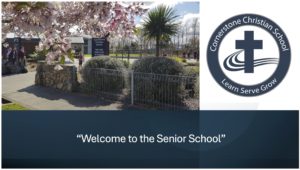CCS Senior School Philosophy and Purpose
A Focus on Academic Attainment and Character Development
“In the Senior School, our mission is to cultivate academic excellence through character development, preparing students for the world beyond school while guiding them to connect with their future pathways. We foster an environment where students can develop critical thinking, embrace challenges, and discover their passions as they transition into early adulthood.
We prioritise leadership and service, providing opportunities for students to enhance their leadership abilities, understand their influence in the world, and contribute to positive change in their communities. Our curriculum encourages students to pursue their individual goals while nurturing a strong sense of responsibility and integrity to those around them.
In the Senior School, we continually reflect and adapt our practices while remaining grounded in the principles of our faith and the values that guide our community.
In collaboration with our parents, CCS students learn that academic rewards come from dedication and that true success is achieved through resilience—persevering through obstacles and learning from setbacks. They come to understand that each person is endowed with a purpose, which begins with striving to be the best version of themselves as designed by God.”
James Rose
Deputy Principal
Leadership
Assistant Principal: Mr Hayden Hewitt
Principal’s Nominee: Dr Bronwyn Boddy
Careers Advisor: Mr Nate Sextus
Academics
Students in the Senior School study the full NCEA Level 1, 2 and 3 courses.
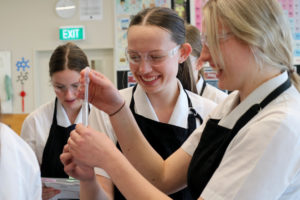
Committing to undertaking all three full NCEA levels is an essential step in ensuring a well-rounded and comprehensive education. Each level of NCEA builds upon the previous one, gradually advancing students’ skills, knowledge, and critical thinking abilities. Level 1 establishes foundational competencies in core subjects as well as general subject knowledge, while Level 2 provides deeper specialisation and prepares students for more rigorous academic challenges. Level 3 caps this journey by equipping students with advanced understanding and analytical skills that are highly valued in tertiary education and the workforce. Completing all three levels ensures students receive a robust education that fosters intellectual growth, resilience, and adaptability—key attributes for future success.
Furthermore, the full NCEA pathway broadens opportunities for students beyond secondary school. Achieving all three levels demonstrates perseverance and commitment, qualities that universities and employers highly regard. Level 3, in particular, provides access to university entrance, opening doors to higher education and specialised career pathways. By embracing the full NCEA journey, students position themselves to make informed and empowered choices about their futures, ensuring they are well-prepared to meet the challenges of a rapidly evolving world. Committing to all three levels is not just an investment in academic achievement but also in the development of character and lifelong learning habits.
As they study, all students are encouraged to make subject choices that represent a balance between their interests and their future career or university pathways.
Our NCEA pass rates are among the best in the city. They reflect our dedication to every student who is enrolled in the Senior School, and the dedication of our staff who work constantly to prepare challenging yet meaningful teaching and learning programmes.
Character Development
Through growing to understand that personal character development is the key ingredient to furthering academic success, our students learn to cultivate a strong foundation of integrity, resilience, and empathy. This growth allows them to excel in various areas, including academics, service, sports, music, the arts, and culture. In academics, they approach their studies with responsibility and discipline, leading to improved performance. In service, they develop a commitment to helping others and fostering community awareness.
In sports, character development instills teamwork and perseverance, enhancing their ability to collaborate and handle challenges. In music and the arts, it encourages creativity and self-expression, boosting confidence in their abilities. This holistic approach to education not only enhances individual talents but also prepares students to become well-rounded individuals who contribute positively to society while striving for excellence in all their pursuits.
Discipleship
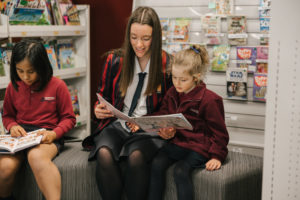
Students are challenged to recognise the relevance of God in our world, their future in Him, their present in grace, and their past through the Cross.
We achieve this through biblical integration across all subjects, adopting a Christian worldview. We emphasise the importance of valuing relationships and the need to repair them when they falter, encouraging students to become the best versions of themselves as created by God.
Senior Colours Award System
Senior Colours are awarded for outstanding attainment in the following areas:
- Academic Merit and Excellence Endorsement at Level 1, 2, and 3.
- Music
- Performing Arts
- Sports
- Service
- YES Programme
Senior Christian Educational Philosophy
Underpinning our educational endeavours are four key foundations.
- Christ is our Saviour.
- We are the ‘body of Christ’.
- We have a purposeful Christian culture.
- We are all made in His image.
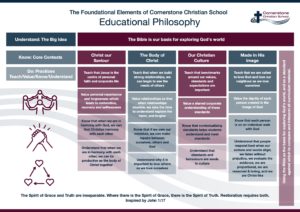
The Narratives and Verse we live by
Within the classroom, teachers weave biblical concepts into their teaching through the lens of narrative and verse.
‘Narrative’, or story telling, is God’s way of helping us and others see His hand in our lives.
The ‘verse’ is His Word and is the standard by which we can interpret the curriculum and the wider world around us.
Homeroom – Supporting the Development of Every Student
All students in Year 11-13 are part of a Homeroom of approximately 15 students. As their advocate, the Homeroom Teacher remains with the group as they travel through the last three years of Secondary School.
Homerooms meet three times per week for 30 minutes a day where they cover the Christian aspects to Learning, Serving, and Growing in God. The following chart models how this can be achieved.
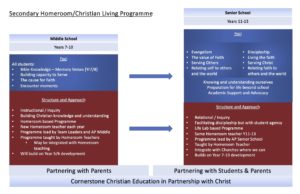
Subject Areas
CCS offers a good grounding in the core subjects with options available outside those subjects. See the map below to see how subjects are made available across the Secondary years.
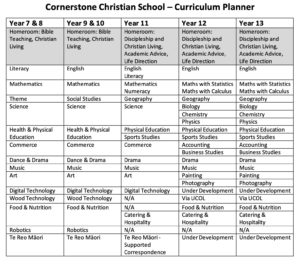 Courses in any given year are outlined in the Senior Course Handbook, published in late Term Three for the following year. These offerings are subject to staff availability, student interest, and resource constraints.
Courses in any given year are outlined in the Senior Course Handbook, published in late Term Three for the following year. These offerings are subject to staff availability, student interest, and resource constraints.
Timetable
CCS operates a 10 day timetable with 60 minute periods. Homeroom splits period 4 into two 30min periods on Monday / Tuesday / Wednesday. Utility occurs each Friday afternoon – a period that cycles through either additional homeroom time, assemblies, or school activities.
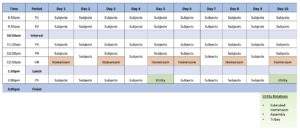
Difficult Conversations – Preparation for Life Beyond School
A key aspect of preparing students for life after secondary school is creating a safe space for them to ask challenging questions, particularly about faith.
Discussions may arise spontaneously around sensitive topics related to our country, the church, lifestyles choices, and the like. Teachers manage these conversations and may share their perspectives when appropriate. It’s important to note that such discussions are not necessarily part of the formal curriculum and do not necessarily reflect the teachings or positions of the school. However, they often occur because students are interested in these topics. Legally, each student is entitled to their own opinion and freedom from discrimination. This legal provision must be upheld in our school at all times.
Most of these discussions will naturally arise as part of daily school life, both in the classroom and in the wider school environment. We encourage parents to engage in similar conversations at home so students can hear family and denominational perspectives.
If any student prefers not to participate in such spontaneous discussions, they can notify the teacher and use the study room during that time.

